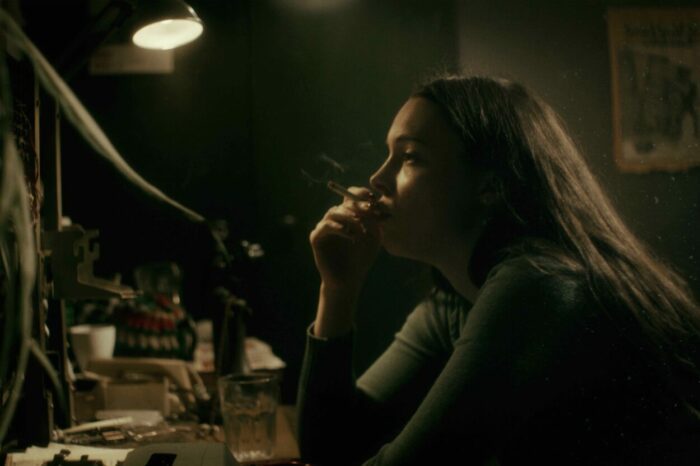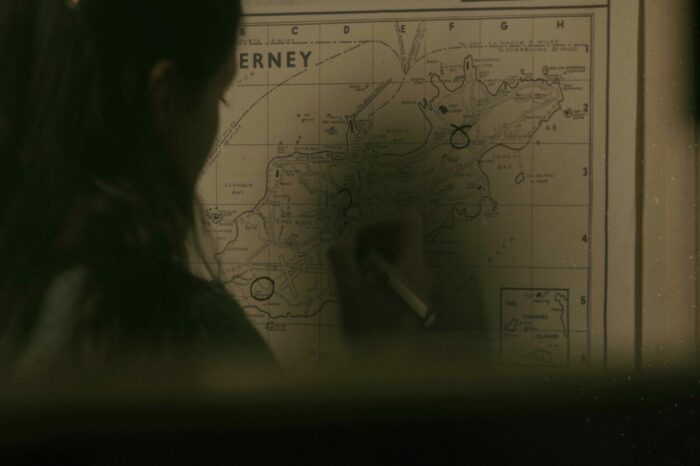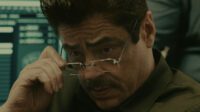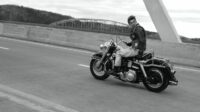The British drama On the Line is writer-director Oliver Pearn’s first feature film. In it, Victoria Lucie stars as Agnes, a switchboard operator on the Channel Islands in the mid-1960s who overhears what sounds like a kidnapping and who must, though she is confined to her workstation, use her deductive reasoning and communication skills to solve a mystery. With only a single actor visible onscreen, On the Line sets itself a considerable challenge: to build narrative suspense and develop characterization while staying in a small, confined space. While Lucie’s character can act only against props and sounds, the director, Pearn, develops the storyline through information parceled out in brief—and sometimes ambiguous—phone calls.

As one might imagine, On the Line‘s central conceit accommodates a smaller budget than many features but at the same time poses new challenges for everyone involved, from the writer-director to the featured actor and supporting voice cast to the crew, including those responsible for the wardrobe, sets, cinematography, sound, music, and editing. Pearn, who honed his skills on microbudget independent horror features before contributing to the series Rings of Power and Masters of the Air and the film Napoleon, spoke to Film Obsessive’s Executive Editor J Paul Johnson to discuss On the Line‘s production and distribution. The interview has been edited for space and clarity; scroll below for the full video.
Film Obsessive: Your first film On the Line features a single protagonist on screen for the entirety of its duration. I’m just curious how this concept came about and what you looked to for inspiration.
Olive Pearn: Yeah, I thought having one person on screen would be really easy to write and direct. But it wasn’t easy to because you have to make it interesting. So there was a challenge. But I come from a background as an AD and I thought, look, I want it to be really easy because I did this one film where we were trying to do 20 locations, not enough days. And I thought not again. I just thought, look, let’s keep it simple and just really go back to the basics and get that right.
I really love the film Slender Thread (1965), a Sidney Poitier film. There’s lots of these inspirations and references that I love in old films, I think there is that there’s a very old nostalgic feel about the On the Line. Lots of people say, oh, it’s a bit like Hitchcock. Which is great. I mean to be in the same breath as that, but it’s old style filmmaking.
Your primary actor, the only one who’s visible on screen for the duration of the film, Victoria Lucie, plays Agnes, a switchboard operator who hears evidence of a crime. I’m wondering how you cast her in particular, and what can you tell us about her performance?
She comes from a background in theater. She was on the West End production of The Mousetrap. That was really important for me when I was casting, that I had someone with that theater experience, and what I was looking for, what they’re doing when they’re not speaking. Because you don’t leave Vicki for ten-minute takes, you know, there’s a lot of times when she doesn’t speak for a minute, when she’s listening. Well, there’s one place where I really try that and push that to its maximum. Usually she’s very active. When she’s not speaking and it’s reaction, acting is reacting. And a lot of actors don’t always know it’s all about their lines. And then they’re on their phone between lines, and then they’re saying their next line, we had none of that. So it was all on her and she took it all on her shoulders and, you know, I had it from the beginning when I wrote the script.
You usually break scenes down by external internal location and day or night, right? But we didn’t do that. We did it by time of day, which was actually cheating in a way. So I could do it by [individual] shots. She knew that. She had to know if I had an eight page, she had to do eight or if it was a quarter of page. You know, that was easy, it was very in built and she knew what she needed to learn lines-wise quite early on and we tried to stick to that. Of course there’s some flexibility and she’s so amazing. We could try things out differently, but she was amazing.
We didn’t know if it was going to work. And the biggest threat to the film, on the first day, we had this switchboard that was actually a fake front of the switchboard with the lights. I was operating the lights as well as directing everything else. We had a switchboard expert there and I was consulting with them. We asked him and we had take his input and we did it as accurately as we could. But we didn’t know if we had a film because we weren’t sure if she was going to be able to operate the switchboard, juggle accents, and act and get all the phone calls coming in from other places.
That sounds like quite a challenge. Unlike in theatrical acting, almost all of her work in your film is in close-up. I want to hear also a little bit about the production itself and the technical details. So Victoria is the only one who’s on screen, the only physical actor, but you have perhaps a dozen voice actors. Are they present during the production, at the same time that she is, or were they prerecorded, then played on set for her to respond to? Or were the entire processes completely separate and then mixed together?
All three!
I didn’t want to have a dry AD reading in. That’s something I really wanted to avoid because we have these long cuts and long takes the timing has to be right. Invariably if you get someone dry reading in the times would all be wrong when you get to do it properly. Later on, we did do ADR, where we filled in about probably 15 of those voices. But I did have three or four actors there [on set]. Joanne [Rogers], who plays Martha; Thomas Bliss [who plays], Frank—a couple of the voices, and they were talented. They could fill in for the other voices as well. That was brilliant actually. It made a great set as well, really acting. It was quite fun because we had, for one of the scenes, five voice actors all on different lines calling in. And it was a bit like where they calling from. We had someone in an RAC hut outside, one in a Dr. Who’s Tardis, and one in some other place [an updated 1970s Telephone exchange]. It was cool and we made it work.

What were some of the other technical challenges? I’m just thinking in terms of one room, one actor set for the most part—cinematography, editing, or sound?
I got to edit in my head because we shot it chronologically. That was very unusual and it was great to be able to do that. I had a very clear idea and I was speaking with my DP a year before we went into production. We had it very tight. Although especially later on we got ideas as we went along with script. My thought that’d be right for that moment. We love the top down shots, we went back to that. That was our go to.
But sound is so crucial in it and it’s probably more important than anything else. This film wouldn’t work without sound being believable. We spent a lot of time on that and we recorded everything again. Put the sounds in, they’re all authentic sounds. The sounds that we recorded there and recording sounds, and when you’re waiting for the line, when lines open, someone’s on it, on it. It was the actual right sounds. I should get a lot of branding points from all the switchboard people!
What’s really cool as well is Matthew Collins, the composer. He incorporated those sounds into the actual soundtrack, and that worked really well because they’re quite mundane sounds in a switchboard room, really, he gives it life and it becomes this entity of its own. It’s living, breathing. The machines do actually operate randomly. I love that element. It feels alive and very claustrophobic. When you can play with what you’ve got, you really ramp that up.
It’s a technology that watching on screen feels completely antiquated. But as I was watching, I was also reminded today of how almost every GPS or voice assistant is gendered as female, just as switchboard operators were mid century. I’m just curious what drew you to that technology in the first place.
Yeah, it’s really interesting. I mean, I read history at university and I think that’s got something to do with my love for old machines and watches and everything like that. But I think there’s also something about I want to preserve these things. This is the last operational switchboard in the UK, and once these enthusiasts no longer able to look after it, this knowledge is going to disappear. It was just great to be involved with just recording it as it was and keeping it alive and it’s like a time capture in a way, but it feels very modern. There was that blend of classicism, modernity, even how we shot and how it sounds.
It’s really worthy of exploring where a woman like Agnes was entirely responsible by herself for much of the communication on those islands. And a lot of that communication was simply put, life or death.
Well, exactly. I mean the theme of the film really is community in the guise of thriller. But it’s about community. She is that central pin, she’s at the center of it, but she’s also so far removed from it because she’s isolated. And I love that dichotomy of it, yeah, is something there. She’s the glue holding the island together. I think she actually says that as one of her lines!
And that’s true with AI and things changing today. It’s amazing that these professions have died out and seemed so abstract and so different in the future. Things are all changing at the moment. With AI, things are going to be changing in the future. Again, it is just the importance of these professions. We value them, we value female work. And there’s a lot of questions about 1960s, ’70s attitudes to females, roles, and workplaces. This was probably one of the only roles women were able to do. It’s so important that they did this important job. It was hard. [Agnes] is doing the maintenance of the switchboard, which lots of people told me she wouldn’t do. But actually I went to the experts and they told me that they [women] probably did.
I appreciated her skill with a soldering iron! In the first couple seconds of the film, it looked like work that needed to be done. You mentioned Hitchcock briefly, and as I watched your film, I was reminded a little bit of Rear Window where the protagonist’s perspective is limited and forced. And as we learn, its also partial in a way. Were there other films along the way that you looked to, perhaps for reference in your film or for inspiration?
Yeah, there’s a very established set of films, claustrophobic films in this vein. There’s a film called Kimi that came out last year. And there’s another one that played South by Southwest this year called Monolith. There’s lots of these one-person, one-location films that do do it. I think it’s such a hard one to get right. I’m not sure we got there, but we tried. I really love the theme and just where it goes to really.
But I think looking at the old films, the greats, and what they can do in one location and the way they blocked it, worked for me. My inspiration actually, in the guy who showed me that I could do it was Béla Tarr. There’s a film called Autumn Almanac (Almanac of the Fall). He’s a very expressionist. It also doesn’t really have a plot. It does have a plot, but it’s not a genre film. The simple camera actions and just the sense of place that it gives you really inspired me and made me believe I wanted to give it a go, but also put my own touches on it in the future.
Do you see yourself working more in this vein, or are you looking towards working with casts of thousands, lots of green-screen effects, widescreen epics, and the like? What’s next for you, Oliver?
I wouldn’t say no to that!
I’m just really quite excited to see what opportunities come up through this film. I’d love to stay in narrative and that’s really where my passion is because that’s just what I get the most out of. [Working in] indie films is difficult. At the best of times we see whether that takes me, if I go down the TV route and get great experience of working with actors and working against the clock.
There’s still lots of times ahead, but you know, I’ve worked on Masters of the Air, I’ve worked on Napoleon, and I’ve just come off Rings of Power for Lord of the Rings where I’ve been on set every day as a PA rather than anything else. But it’s great to be absorbed in that world and see how it’s done. At that level, it doesn’t seem impossible. I think in a lot of ways because you’re not wearing so many hats, there’s difficulties with it, managing producers and expectations. But in terms of creatively doing what you want to do, that would be great to get there and not actually that daunting. But see, I love character-driven stories and that’s what On the Line is more than anything with a strong character and building the world around it.
And what’s next for On the Line?
It’s playing at Newport Beach Film Festival in about ten days. I’m going out to that and it’s a great chance to celebrate the film. We’re halfway through our festival run now and it’s going to have its release in January next year, which will be great. So we go up on all the platforms and I’ve got a sales agent and they’ve done a great job and they’ve got a distributor on board. I went to the European film market and walked the pavements and got something together for it. That was good. And it’s all been incredible experience. The film is doing really well. We got an MG [Minimum Guarantee] on recouping our money: we sold the two big regions. It’ll be great to see what really comes of it.: we need Canada and Australia, and I think we’ll be happy.
Oliver, congratulations on the successes of On the Line so far. Best wishes for all your work in the future. And thank you so much for taking the time to speak with us at Film Obsessive today.
Thank you, Paul. I’m glad you enjoyed the film.




